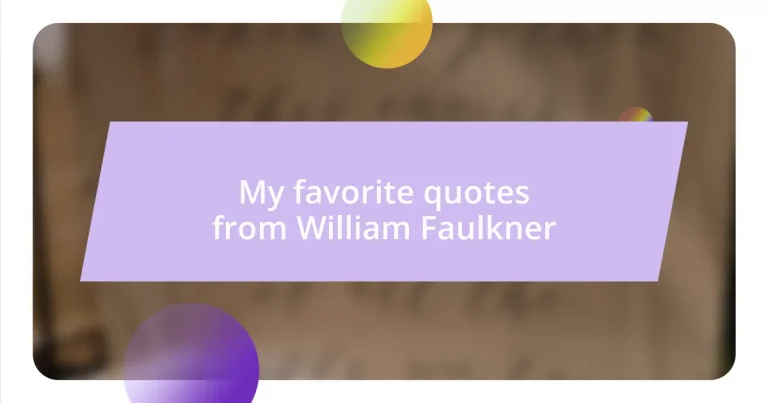Key takeaways:
- William Faulkner’s writing explores complex themes such as family, identity, memory, and the Southern experience, often through a stream-of-consciousness style and non-linear narratives.
- His quotes emphasize the enduring influence of the past, the courage needed to embrace change, and the bittersweet nature of aspirations and desires.
- Faulkner’s ability to capture the human experience provides solace and insight, encouraging readers to reflect on their own histories and the interplay between past and present.
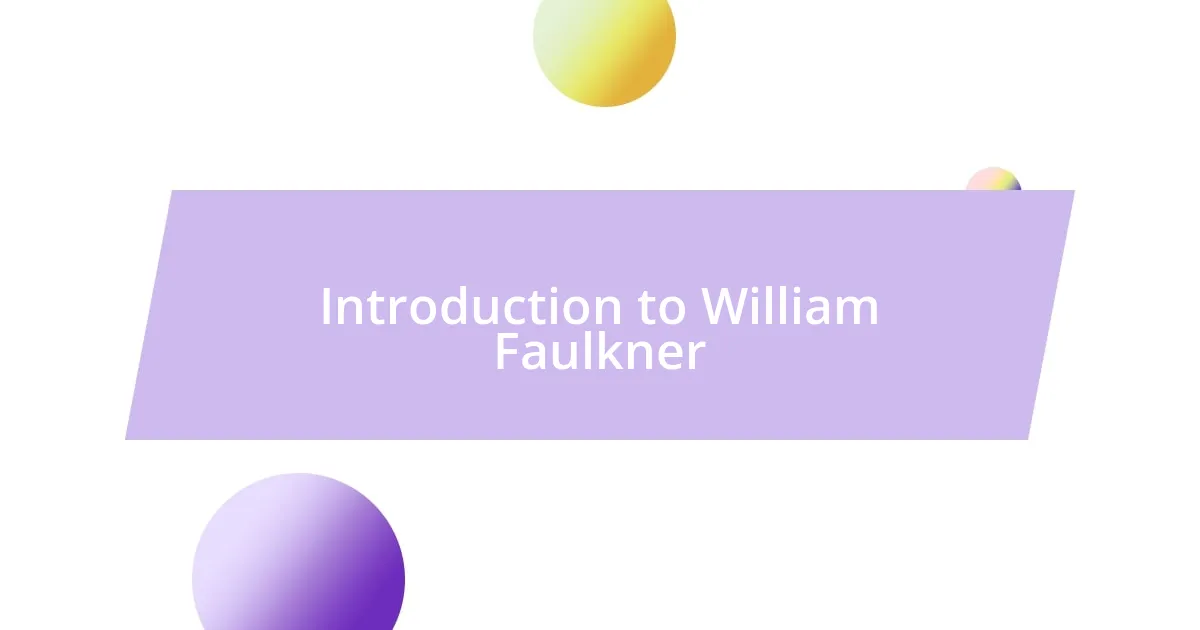
Introduction to William Faulkner
William Faulkner, a literary titan of the 20th century, is renowned for his deep exploration of the human psyche and the complexities of Southern life. I remember the first time I picked up “The Sound and the Fury.” The intricate narrative style captivated me; it was a journey through time and emotion that resonated long after I turned the last page. How could a single story carry so much weight and still feel so profoundly personal?
Faulkner’s work often delves into themes of family, identity, and the passage of time, reflecting the intricacies of the Southern experience. The way he manipulates language and structure mirrors the chaotic nature of his characters’ lives, creating a vivid tapestry of emotions. Have you ever considered how the context of a writer’s life shapes their stories? In Faulkner’s case, his upbringing in Mississippi significantly influenced his depiction of the South, providing rich historical layers to his narratives.
His use of stream-of-consciousness writing and multi-layered plots challenges readers but ultimately invites us to connect with complex feelings and situations. I often find myself pondering his quotes, letting them soak into my mind, pondering their implications in my own life. What is it about his words that resonate so deeply? Perhaps it’s the raw honesty that reflects our own struggles and triumphs, reminding us that we are not alone in our experiences.

Understanding Faulkner’s Writing Style
When I think about Faulkner’s writing style, I immediately recall the way he crafts his sentences with both complexity and beauty. His prose often weaves in and out of traditional narrative forms, creating a swirling atmosphere that feels almost dreamlike. It’s as if he invites us into his characters’ minds, letting us experience their struggles and triumphs firsthand—a technique I found profoundly moving during my readings of “As I Lay Dying.”
Here are some key features of Faulkner’s style:
– Stream-of-Consciousness: A narrative mode that mimics the natural flow of thoughts and feelings, making readers feel as if they are inside a character’s head.
– Non-linear Narratives: He often juggles different timelines and perspectives, highlighting the complexity of memory and experience.
– Rich Symbolism: Faulkner’s use of symbols, like the recurring motifs of time and decay, adds layers of meaning to his stories.
– Unique Sentence Structure: His long, winding sentences can evoke deep emotions, requiring readers to slow down and savor each word.
– Southern Gothic Elements: Faulkner frequently combines haunting imagery with themes of decay and moral ambiguity, creating a distinctly Southern atmosphere.
Reflecting on my own experiences with his works, I remember grappling with the narrative shifts in “The Sound and the Fury.” Each time I revisited it, I discovered something new, like peeling back layers of an onion. It became more than just a book; it was an exploration of identity and the human condition. This intricate style can be challenging, but the journey it offers is immensely rewarding. If you haven’t already, I encourage you to immerse yourself in his unique approach—every line feels like a conversation waiting to unfold.

Themes in Faulkner’s Quotes
Faulkner’s quotes often echo the complex interplay of personal and collective memories, revealing the deep connections we share with our past. It’s fascinating how he explores the weight of history and how it shapes identity, especially in a Southern context. I remember grappling with a particular quote of his that spoke to the cyclical nature of time. It struck me then—and still does—that our past cannot simply be erased; it is woven into the fabric of our lives. This is something I often reflect on when faced with my own family’s history and how it influences my choices today.
Moreover, themes of solitude and conflict emerge prominently in Faulkner’s works. His characters frequently face internal and external struggles that resonate deeply with our own experiences. I once found myself identifying with a character wrestling with their place in the world, which led me to a profound realization about my own struggles with acceptance. Faulkner’s ability to capture the pain and beauty of these moments provides a poignant reminder that we are all navigating our tumultuous paths, even when it feels uniquely isolating.
Lastly, the theme of family—its bonds and its burdens—recurs throughout Faulkner’s quotes. I recall an instance where I stumbled upon a quote about familial ties that resonated deeply with me. It made me contemplate the complexities within my own family dynamics, particularly the love that persists amidst conflict. This reflection brought back memories of family gatherings that were both heartwarming and strained. It’s this blend of emotions that Faulkner masterfully captures, allowing us to see ourselves in his words while navigating our relationships.
| Theme | Description |
|---|---|
| Memory | Explores how the past affects personal identity and choices. |
| Solitude & Conflict | Captures internal struggles and the universal search for belonging. |
| Family Dynamics | Highlights the complexities of love and tension within families. |
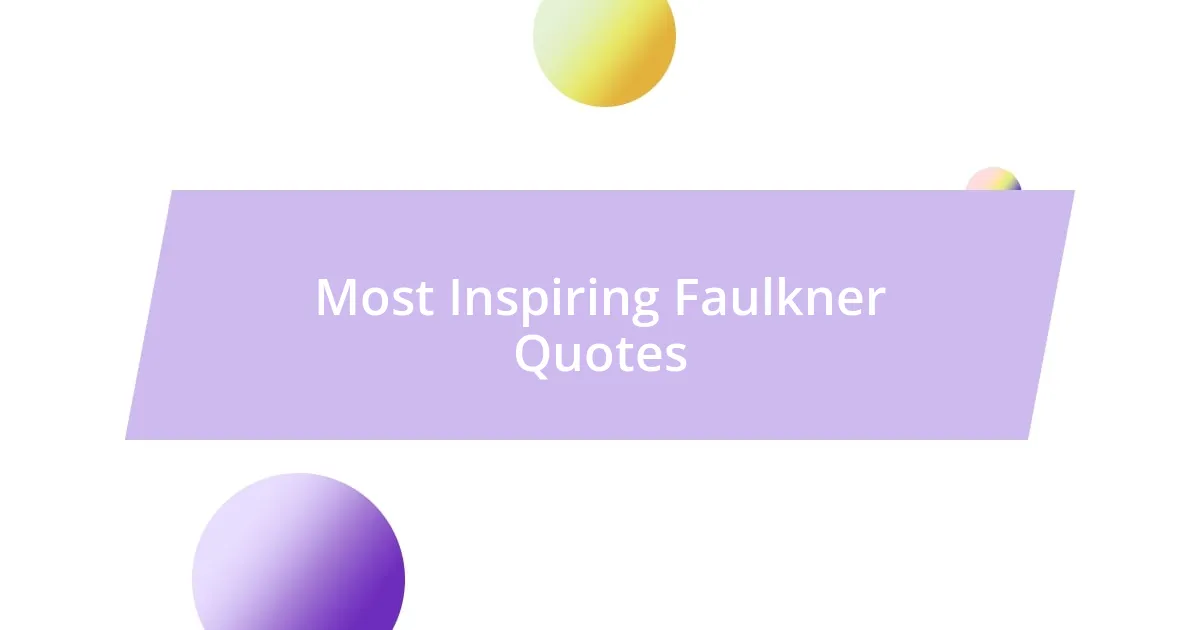
Most Inspiring Faulkner Quotes
There’s something incredibly stirring about Faulkner’s ability to encapsulate the essence of human experience in just a few words. One quote that strikes me is, “The past is never dead. It’s not even past.” This sentiment resonates deeply, especially when I reflect on my own life choices and how they’re intertwined with my history. Think about it—how often do our past experiences influence our present decisions? I find this interplay to be a crucial reminder that while we strive to move forward, the shadows of our past continue to shape us.
Another quote that I carry with me is, “You cannot swim for new horizons until you have courage to lose sight of the shore.” This idea of letting go resonates so strongly with me. I remember times in my own life where stepping into the unknown felt daunting, yet it was exactly those moments that led to my greatest growth. Have you ever felt that tug between comfort and adventure? I’ve learned that embracing uncertainty often unveils new opportunities and perspectives.
Lastly, the quote, “I give you the mausoleum of all hope and desire; I give it to you, not that you may remember time, but that you might forget it now and then.” This one can feel like a bittersweet surrender. It evokes a profound sense of longing and resignation that I sometimes feel when reflecting on my dreams. It begs the question: can we truly let go of our expectations without losing a part of ourselves? In grappling with this, I find solace in knowing that it’s okay to pause and acknowledge both my hopes and my disappointments, for they are all part of the rich tapestry of life.
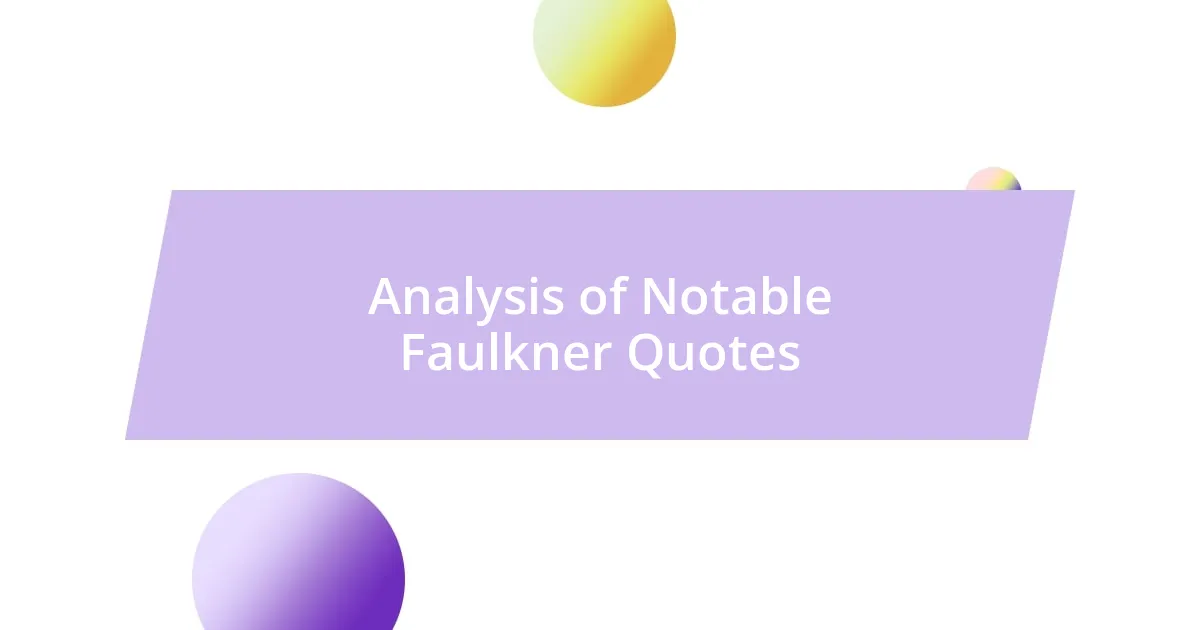
Analysis of Notable Faulkner Quotes
One quote that intrigues me is, “You cannot swim for new horizons until you have courage to lose sight of the shore.” This gets to the heart of risk and reward in life, and I can’t help but think back to moments when I faced a crossroads. Like the time I decided to leave my stable job to pursue a passion project. The fear of the unknown was overwhelming, but what I discovered about myself during that leap was far more profound than the safety I relinquished. Isn’t it interesting how often we cling to familiar ground, even when potential awaits beyond our comfort zone?
Another notable quote of Faulkner’s is, “The past is never dead. It’s not even past.” This statement really resonates with me as I reflect on the ways our histories haunt us. For example, when I revisit old journals, I often find echoes of my younger self grappling with dreams that remain unfulfilled. It makes me question: how much of what we are today is shaped by what we’ve left behind? I believe that recognizing and reconciling with our past is essential in carving our path forward. It’s a recognition that allows us to wield our history as a tool rather than a shackle.
Lastly, Faulkner’s quote, “I give you the mausoleum of all hope and desire; I give it to you, not that you may remember time, but that you might forget it now and then,” speaks to the bittersweet nature of our aspirations. I often find myself holding onto dreams that seem out of reach, yet I realize how they can weigh me down. Have you ever wondered if forgetting our aspirations might lead to new, unexpected joys? In my experience, embracing the idea of letting go—if only temporarily—can open doors to fresh possibilities, reminding me that life’s beauty often lies in the journey rather than a singular destination.

Applying Faulkner’s Wisdom Today
Reflecting on Faulkner’s wisdom, I often find that his insights about the past resonate with my day-to-day decisions. Recently, while organizing old photographs, I stumbled upon images that sparked a flood of memories—both joyous and painful. It made me wonder: how much of who we are today is influenced by the fragments of our history? For me, those moments reinforced the notion that, to truly grow, we must engage with our past instead of trying to erase it.
As I consider the courage it takes to step into new horizons, I recall the day I took a chance on a hobby I had shelved for years. Initially, the fear of failure held me back, but once I embraced that risk, it transformed my life. Have you ever faced a situation where the unknown felt frightening yet thrilling? I learned that sometimes, the greatest treasures lie just beyond the edges of our comfort zones, waiting for us to discover them.
There’s something incredibly freeing about Faulkner’s idea of letting go of hopes and desires. A while back, I made the difficult choice to step away from a long-held dream that no longer resonated with me. Although it felt like a loss at first, I realized that this space allowed new passions to emerge. Isn’t it fascinating how relinquishing one dream can pave the way for unexpected joys? I’ve come to appreciate that life is not a linear path; it’s a beautiful mosaic of experiences, shaped by both what we cling to and what we choose to release.
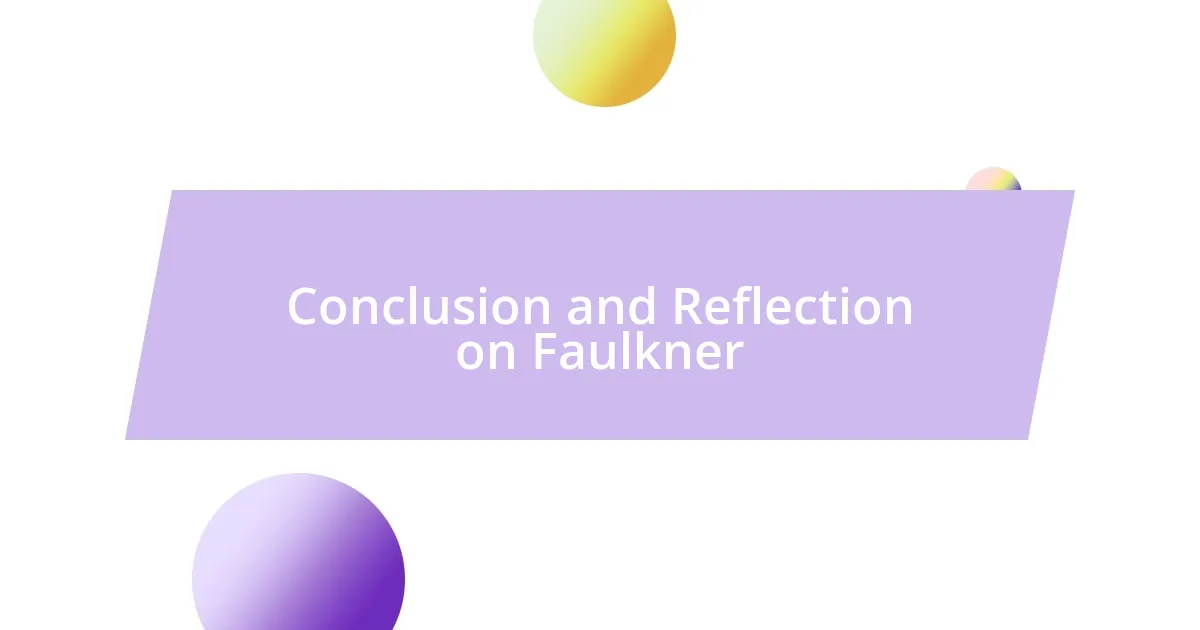
Conclusion and Reflection on Faulkner
Reflecting on Faulkner’s work leaves me in awe of his ability to capture the human experience with such depth. I remember finding solace in his writing during a particularly tumultuous time in my life. While navigating complex emotions, I stumbled upon his quote, “I believe that man will not merely endure: he will prevail.” It fueled a spark of determination within me—reminding me that even during hardship, resilience is rooted in our very nature.
Faulkner’s exploration of the past often leads me to contemplate my own journey. One evening, while walking through my childhood neighborhood, memories flooded back—some bitter, others sweet. It stirred a realization that our experiences, both good and bad, are not to be discarded but embraced, allowing them to shape our identities. How often do we overlook the power of our narratives in defining our future? I’ve found that reflecting on my past gives me strength to face new challenges, bridging who I was with who I aim to become.
In the spirit of Faulkner’s reminder to sometimes forget our limitations, I recently decided to take a break from my daily grind. I stepped away from my computer and ventured into nature, allowing myself to breathe and just be. It’s surprising how a moment of stillness can illuminate new perspectives and ambitions. Isn’t it liberating to realize we can recalibrate our desires? I find comfort in the notion that giving ourselves permission to pause can unlock paths we never thought possible, mirroring the ebb and flow of Faulkner’s own brilliant storytelling.












